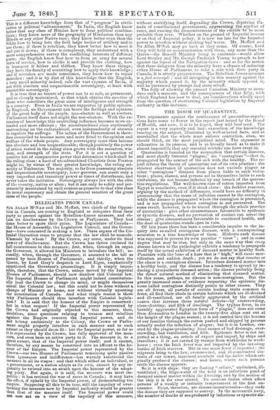DELEGATES FROM CANADA.
SIR ALLAN M'NAB and Mr. Moffatt, two chiefs of the Opposi- tion in Canada, are coming to England as delegates from their party to protest against the Rebellion-Losses measure, and ob- tain its disallowance by the Crown or Parliament. They had done better to spare their pains. The Legislature of Canada— the House of Assembly, the Legislative Council, and the Gover- nor—have concurred in making a law. These organs of the Co- lonial Opposition come to propose that the law shall be unmade. Unmade by whom ? By the Crown, say some, under its final power of disallowance. But the Crown has thrice declared its full concurrence in this measure; first, when, through its organ the Governor, it allowed his Ministers to introduce the bill; se- condly, when, through the Governor, it assented to the bill as passed by both Houses of Parliament; and thirdly, when the Queen, by Lord Grey's despatch to Lord Elgin, emphatically sanctioned the Governor's proceedings. It is simply impos- sible, therefore, that the Crown, unless moved by the Imperial Houses of Parliament, should now disallow this Colonial law. The Imperial Houses of Parliament might indeed constitution- ally lead the. Crown to change its mind, or might themselves annul the Colonial law ; but this could not be done without a change of Ministry at home, nor without virtually upsetting the constitution of Canada. And what single reason is there why Parliament should thus interfere with Colonial legisla- tion ? It is said that the honour of the Empire is concerned: but in what respect? If the Imperial power represented by the Crown had originally objected to this measure, then, doubtless, since questions relating to treason and rebellion against the Empire concern the Imperial power, and do not belong exclusively to the Colony, the Crown or Parlia- ment might properly interfere in such manner and to such extent as they should deem fit : but the Imperial power, so far as it is represented by the Crown, has fully approved of the mea- sure, and even been an active party to it. The measure is, to a great extent, that of the Imperial power itself; and it cannot, therefore, by any means be construed into an affront to the ho- nour of the Empire. The Imperial power represented by the Crown—our two Houses of Parliament remaining quite passive from ignorance and indifference—has warmly sanctioned the measure in all its stages : and that which either an individual, or
government, or a nation adopts as its own, cannot by any in- genuity be twisted into an attack upon the honour of the adopt- Mg party. But again, it is said, the measure was most im- politic: it has revived the war of races in Canada ; it may have the effect, if upheld by the Imperial power, of dismembering the empire. Supposing all this to be true, still the impolicy of over- turning the measure now by Imperial authority would be greater than that of the measure itself. The Imperial power could not nom act on a view of the impolicy of this measure, without stultifying itself, degrading the Crown, depriving Ca- nada of constitutional government, aggravating the ,conflict of races, and causing the dismemberment of the einfiiit to be more probable than ever. Whether on the ground of Imperial honour or on that of Imperial policy, it is now too late for the Imperial power to interfere without making bad worse. Mr. Moffatt and Sir Allan M'Nab may go back as they come. Of course, Lord Grey will hold no communication with them, any more than the Queen—the Russell Ministry being in existence—would allow Lord Stanley and Mr. George Frederick Young to preach to her against the repeal of the Navigation-laws : and as for the notion that these delegates from the minority have a chance of inducing either House of Parliament to take a side with their party in Canada, it is utterly preposterous. The Rebellion-Losses measure is afait accompli ; and all intriguing in this country against the majority which passed it, by the minority which opposed it, will be prevented by prompt and stern rebuff. The folly of allowing the present Canadian Ministry to intro- duce such a measure, and the consequences of that folly, with which England has now to deal, are considerations wholly apart from the question of overturning Colonial legislation by Imperial authority in this instance.


























 Previous page
Previous page